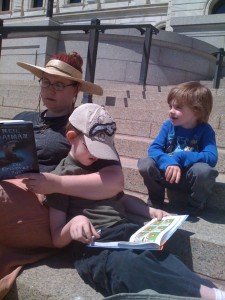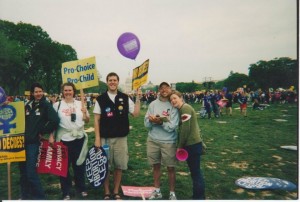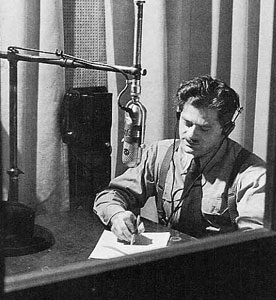 Political Science, Psychology, Sex Ed, Social Studies
Political Science, Psychology, Sex Ed, Social Studies  4 Comments
4 Comments Excuse me, I’m having a moment here
You know those people who always say, “There’s a reason for everything that happens?”
Yeah, I usually want to kick them in the crotch, too.
But even as I say that, I have to admit that I’ve seen meaningful patterns in my life, time and time again, for which there’s no rational explanation. Doors closing, windows opening–call it what you will. I’ve just found myself in too many places I shouldn’t have been that turned out to lead me to exactly where I was meant to be.
That’s why, when people ask me if I could “take back” my sexual assault or my fibromyalgia or the hell we’ve been through with Connor, I answer, fast as a snap, “No!” Those things made and keep making me the person I am, and I love where and with whom I am far too much to risk changing even one crappy thing in the past.
For the most part, I perceive these patterns from afar, like an aerial photograph of where I’ve been. But I’m in the midst of an amazing moment right now, when I see them crystallizing right before me. I am precisely where I am supposed to be, where I’ve been headed for decades.
 I’m volunteering for Minnesotans United for All Families, the coalition fighting the constitutional amendment that seeks to limit the freedom to marry in Minnesota for generations to come. It’s on the ballot in November, the 31st of these elections when a basic human right for a whole group of people is put up for popular vote.
I’m volunteering for Minnesotans United for All Families, the coalition fighting the constitutional amendment that seeks to limit the freedom to marry in Minnesota for generations to come. It’s on the ballot in November, the 31st of these elections when a basic human right for a whole group of people is put up for popular vote.
We aim to be the first to defeat this kind of attack.
I’d already committed to be part of this effort, but when one of the organizers here in Saint Paul came to me to ask if I would step up as a team leader and put in about 6-8 hours a week on the campaign (until it becomes much, much more, when the leaves start falling from the trees). Frankly, I might’ve been smarter to say no, but I’d wanted a way to engage more with the campaign so, like the Overcommitment Princess I am, I said, “Bring it.”
I’ve attended trainings and phone banks, planning meetings and launch parties. I’ve met more new people on the campaign than I may have met in the whole time I’ve lived in Minnesota. They’re running a crazy-smart campaign here, unlike anything that’s been attempted anywhere else, focusing on personal conversations about love and commitment, rather than discrimination and legal protections, with over 1 million voters. And the longer I’m in this thing, the more I know that the skills I’ve acquired all come together for this work.
A lot of the work is very similar to teaching. Informing voters, training volunteers, and coordinating teams has shades of lecturing, discussing central concepts, guiding and supporting folks so they can reach their own conclusions on the subject. I appreciate my experience with non-traditional students and different ethnic constituencies–this coalition is so broad and deep, uniting across so many communities.
I’m finding my crisis counselor training to be very useful too. Having intense conversations about values with strangers, neighbors, and friends, as well as training others to have those conversations, requires active listening, something that doesn’t (but should) get taught in everyday life. It’s hard not to use my Rogerian reflective statements, but I’m allowed to get invested in the stories I’m telling and hearing in a way I couldn’t as a counselor. I’m walking with people through memories, and feelings, and judgments that sometimes unravel or take shape at the same time as the words cross their lips. It’s incredibly powerful.
And I’ve already expounded on my commitment to philanthropy and social justice activism here on the blog. Though I still feel guilty when I try to own my bisexuality because I’ve never suffered for that part of my identity, this isn’t only an LGBTQ issue. All you have to believe in to fight this amendment is love. I’m living my happily ever after, despite very long odds–I want everyone to have the same freedom and joy.
Even my training as a historian gives me perspective that adds to my sense of privilege at being a part of this. In my religious studies work, I’ve looked at the civil terms and religious blessings on personal commitments in a wide variety of cultures and eras, which is powerfully erosive of many arguments in favor of such an amendment. And knowing the history of milestones like the Loving v. Virginia case, which made interracial marriage legal for once and for all in America in 1967, has opened my eyes to the historical importance of halting the tide of these amendments at last.
So I’m having a moment here. Minnesota’s having a moment too, deciding what kind of state it wants to be. But my moment (as egocentric as it sounds to say it) is more empowering than I think anyone at Minnesotans United knows or cares. I doubt my qualifications, my value, my ability to be useful to anyone, all the time. Every time I recommend myself for something, my heart’s in my throat like I’m jumping off a cliff. I even feel weird thinking about getting business cards made up, because honestly, who would ever want or need to remember me enough to keep my stupid square of cardstock?
But on this campaign, I feel useful. I’m doing good work. I can contribute my skills and my passion, and have it matched and encouraged and appreciated. I feel needed–me, with my quirky, particular bag of tricks. I’m so grateful for the experience that I even offered to dye my hair back to a plausibly human color, if they thought that the coding that happens on first contact would be detrimental to my ability to help effectively. Their response? “No way. Rock the pink hair. We need the pink-haired to feel included too.”
That’s love, folks. That’s what we’re fighting for. And what I’m doing will help us win.

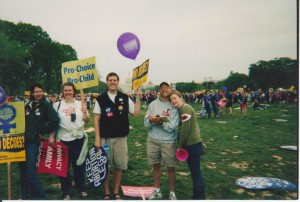


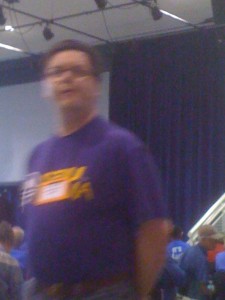
 But the Virginia variant is the first of which I’ve heard that requires an ultrasound performed not by swooshing the wand around in a schmear of goo on the abdomen (transabdominal ultrasound, or TAU), but by inserting a hard plastic probe several inches into the woman’s vagina (transvaginal ultrasound, or TVU).
But the Virginia variant is the first of which I’ve heard that requires an ultrasound performed not by swooshing the wand around in a schmear of goo on the abdomen (transabdominal ultrasound, or TAU), but by inserting a hard plastic probe several inches into the woman’s vagina (transvaginal ultrasound, or TVU). The American College of Radiology and the Radiological Society of North America say that TVU can be useful in early pregnancy; TVU can detect a pregnancy as early as 30 days’ gestation
The American College of Radiology and the Radiological Society of North America say that TVU can be useful in early pregnancy; TVU can detect a pregnancy as early as 30 days’ gestation 
